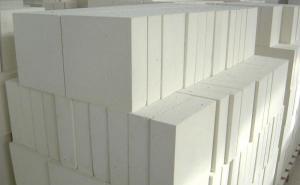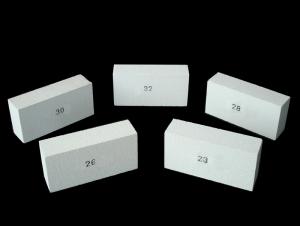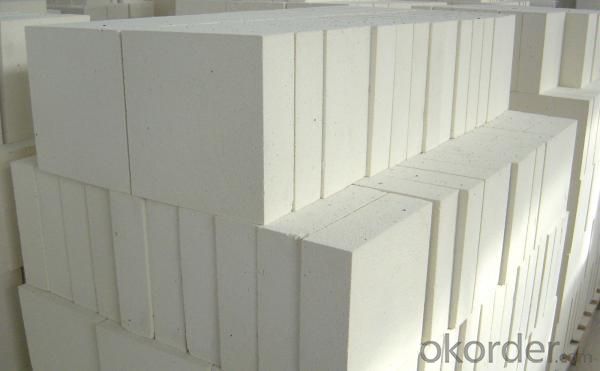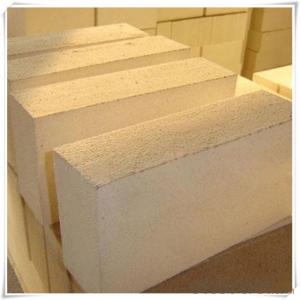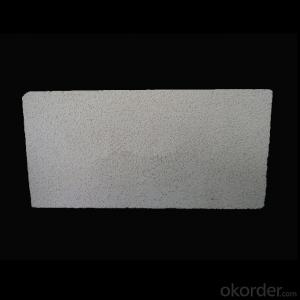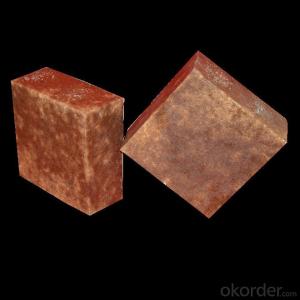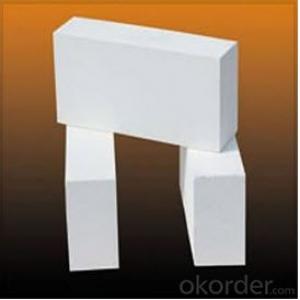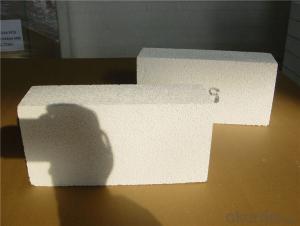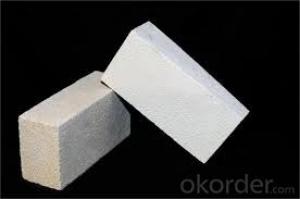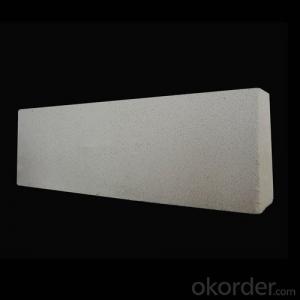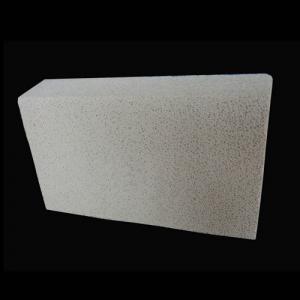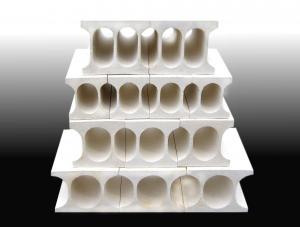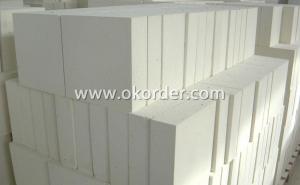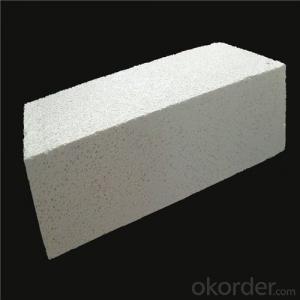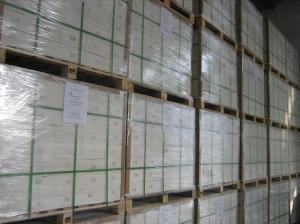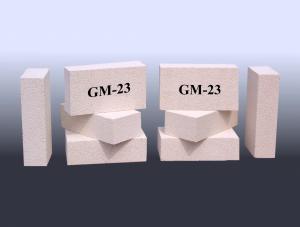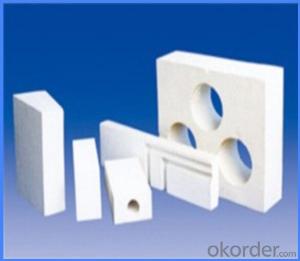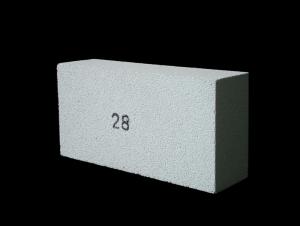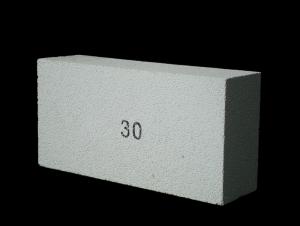Insulating Fire Brick - GJM23
- Loading Port:
- China Main Port
- Payment Terms:
- TT or L/C
- Min Order Qty:
- 1000 pcs pc
- Supply Capability:
- 1000 Tons Per Month pc/month
OKorder Service Pledge
OKorder Financial Service
You Might Also Like
General Information of Insulating Fire Brick GJM23
Insulating fire bricks GJM23 are made from high purity alumina and low iron content raw materials. The insulating fire bricks are produced by mixing, casting or extruding, drying, sintering and grinding. Our insulating fire bricks GJM23 temperature is 1260℃(2300℉). A variety of type could be done according to customer’s request.
To make our firebricks more energy and cost effective, we have different manufacturing methods for our insulating fire bricks casting and extruding method.
For insulating fire bricks GJM23,we choose the casting methord.The casting insulating fire bricks offering the lowest density, the lowest thermal conductivity for the application above 1000℃.
Characteristics of Insulating Fire Brick GJM23
Our insulating fire bricks exhibit the following characteristics:
Light weight and low thermal conductivity allows thinner furnace walls
Low heat storage results in rapid cooling and heating operation
Low iron and impurities to enhance reducing atmosphere
Typical Application of Insulating fire bricks GJM23
Ceramic shuttle kilns
Oil refinery heaters
Laboratory furnaces
Backup insulation for all furnaces
Technical Data of Insulating fire bricks GJM23
|
| JM23 |
Physical Properties: |
|
|
Classifiction Temperature | ℃ | 1260.0 |
Density | Kg/m3 | 550.0 |
Cold Crushing Strength | Mpa | 1.2 |
Reheating Linear Change(24hrs) |
|
|
1230℃ | % | 0.4 |
Hot Load Strength Deform(90 minutes) |
|
|
1100℃ at 0.034 Mpa(5psi) | % | 0.1 |
Thermal Conductivity |
|
|
400℃ | W/m.k | 0.2 |
600℃ | W/m.k | 0.2 |
800℃ | W/m.k | 0.2 |
1000℃ | W/m.k | 0.2 |
Specific Heat | KJ/Kg.K | 1.1 |
Chemical Analysis: |
|
|
Al2O3 | % | 47.0 |
SiO2 | % | 44.4 |
Fe2O3 | % | 0.9 |
TiO2 | % | 1.2 |
CaO | % | 5.2 |
MgO | % | 0.3 |
Na2O+K2O | % | 1.1 |
CNBM has success in insulating fire bricks due to their cost-effectiveness, excellent insulation properties. CNBM also has experience in insulating fire bricks application and would like to assist you in product selection, system design, and installation techniques.
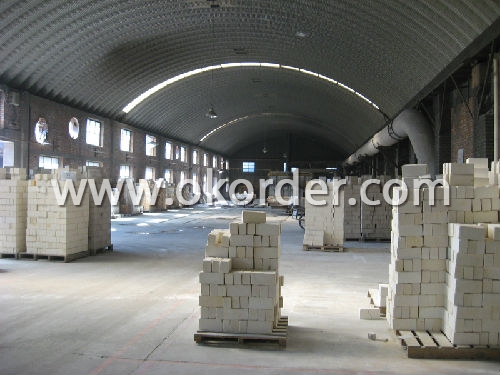
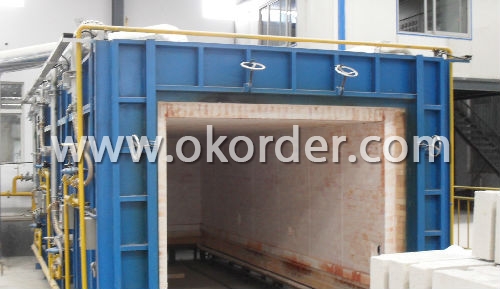
- Q: Can insulating fire bricks be painted or coated?
- Insulating fire bricks can be painted or coated, but it is important to use high-temperature paint or coating specifically designed for use with these bricks to ensure durability and fire resistance.
- Q: Are insulating fire bricks suitable for insulation in steam boilers?
- Yes, insulating fire bricks are suitable for insulation in steam boilers. They are designed to withstand high temperatures and provide excellent thermal insulation, making them ideal for use in steam boilers to minimize heat loss and improve energy efficiency.
- Q: Can insulating fire bricks be used in chimneys?
- Yes, insulating fire bricks can be used in chimneys. Insulating fire bricks are designed to withstand high temperatures, making them an ideal choice for lining chimneys. They have excellent thermal insulation properties, which help to prevent heat loss and increase the efficiency of the chimney. Additionally, insulating fire bricks are lightweight and easy to install, making them a convenient option for chimney lining. However, it is important to note that insulating fire bricks are not suitable for all types of chimneys. It is recommended to consult a professional or chimney specialist to determine the appropriate materials for your specific chimney needs.
- Q: Are insulating fire bricks resistant to fire damage?
- Yes, insulating fire bricks are specifically designed to be resistant to fire damage. They are made from special refractory materials that can withstand extremely high temperatures without deforming or losing their insulating properties. Insulating fire bricks have a high melting point and low thermal conductivity, which allows them to effectively insulate against heat transfer and protect against fire damage. They are commonly used in applications where high temperatures and fire exposure are expected, such as in furnaces, kilns, fireplaces, and industrial processes. Overall, insulating fire bricks are reliable and durable materials that provide excellent protection against fire damage.
- Q: Can insulating fire bricks be used in the construction of hearths?
- Indeed, hearths can be constructed using insulating fire bricks. These bricks are specifically engineered to endure extreme temperatures, rendering them a superb selection for hearth construction. With their low thermal conductivity, they effectively retain heat and hinder the transmission of heat to nearby surroundings. Consequently, they are perfect for establishing a well-insulated and efficient hearth. Furthermore, their lightweight and manageable nature make them highly convenient for construction tasks. All in all, insulating fire bricks prove to be a dependable and pragmatic choice for the development of hearths.
- Q: Can insulating fire bricks be used in high-temperature kilns for pottery?
- Yes, insulating fire bricks can be used in high-temperature kilns for pottery. These bricks are specifically designed to withstand and retain heat, making them suitable for use in kilns that reach high temperatures. They help to insulate the kiln, preventing heat loss and allowing for more efficient firing of pottery.
- Q: Can insulating fire bricks be used in refractory fibers?
- No, insulating fire bricks cannot be used in refractory fibers. Insulating fire bricks are solid bricks made from refractory materials and are used for insulating and retaining heat in high-temperature applications. On the other hand, refractory fibers are lightweight and flexible materials made from ceramic or mineral fibers. They are used for insulation and lining in various industrial applications, including furnaces, kilns, and boilers. The two materials have different properties and structures, and are not compatible with each other. Therefore, it is not recommended to use insulating fire bricks in refractory fibers.
- Q: Are insulating fire bricks suitable for insulation in cryogenic applications?
- Yes, insulating fire bricks are suitable for insulation in cryogenic applications. Insulating fire bricks are made from lightweight refractory materials that have excellent thermal insulation properties. They have low thermal conductivity, high melting points, and are able to withstand extremely low temperatures, making them ideal for cryogenic applications. Cryogenic applications involve handling and storing materials at very low temperatures, typically below -150 degrees Celsius (-238 degrees Fahrenheit). Insulating fire bricks are designed to provide effective insulation in such extreme temperatures, preventing heat transfer and maintaining the desired low temperature. Furthermore, insulating fire bricks are chemically stable and have good resistance to thermal shock, meaning they can withstand rapid temperature changes without cracking or deteriorating. This is particularly important in cryogenic applications where temperature fluctuations are common. In addition to their excellent thermal insulation properties, insulating fire bricks are also lightweight and easy to handle, making them convenient for installation in cryogenic systems. Overall, insulating fire bricks are a suitable choice for insulation in cryogenic applications due to their thermal insulation properties, high-temperature resistance, chemical stability, and resistance to thermal shock.
- Q: What are the dimensions and sizes available for insulating fire bricks?
- Insulating fire bricks come in various dimensions and sizes, but the most common ones are 9x4.5x2.5 inches and 9x4.5x3 inches. However, they can also be found in other sizes, such as 9x4.5x1.25 inches or 12x4x2.5 inches, depending on the specific application and manufacturer.
- Q: Can insulating fire bricks be used in hydrogen furnaces?
- Insulating fire bricks possess the capability to be utilized in hydrogen furnaces, although it is imperative to acknowledge that not all variants of insulating fire bricks are suitable for this particular purpose. Due to the highly reactive nature of hydrogen gas, certain materials can deteriorate or react, thereby giving rise to concerns regarding safety and potential harm to the furnace. When making a selection of insulating fire bricks for employment in hydrogen furnaces, it becomes crucial to opt for bricks that are explicitly designed for environments characterized by high temperatures and corrosive conditions. These bricks ought to be constructed from materials that exhibit resistance against hydrogen embrittlement and possess a low reactivity with hydrogen. Silicon carbide (SiC) and alumina-silica (Al2O3-SiO2) are frequently utilized materials for insulating fire bricks within hydrogen furnaces. These materials boast remarkable resistance to elevated temperatures and remain chemically stable when exposed to hydrogen. Moreover, it is of utmost importance to take into account the density and porosity of the insulating fire bricks. For hydrogen furnaces, it is preferable to employ bricks with low density and high porosity, as they offer enhanced thermal insulation and diminish the likelihood of hydrogen leakage. In conclusion, while insulating fire bricks can be employed in hydrogen furnaces, it is crucial to meticulously select the appropriate type of bricks that are specifically engineered for high-temperature and corrosive environments, and exhibit commendable resistance against hydrogen embrittlement and reactivity. Seeking consultation from specialists in the field and adhering to the guidelines provided by the manufacturer is highly recommended to ensure the safe and efficient operation of the hydrogen furnace.
1. Manufacturer Overview
| Location | Shandong, China |
| Year Established | 2007 |
| Annual Output Value | Above US$ 5 Million |
| Main Markets | 10.00% Northern Europe 30.00% North America 30.00% Eastern Asia 5.00% Africa 10.00% Southeast Asia 15.00% Western Europe |
| Company Certifications | ISO 9001:2008 |
2. Manufacturer Certificates
| a) Certification Name | |
| Range | |
| Reference | |
| Validity Period |
3. Manufacturer Capability
| a) Trade Capacity | |
| Nearest Port | Qingdao Port |
| Export Percentage | 90% |
| No.of Employees in Trade Department | 10 |
| Language Spoken: | English; Chinese |
| b) Factory Information | |
| Factory Size: | Above 16,000 square meters |
| No. of Production Lines | Above 3 |
| Contract Manufacturing | OEM Service Offered; Design Service Offered |
| Product Price Range | High; Average |
Send your message to us
Insulating Fire Brick - GJM23
- Loading Port:
- China Main Port
- Payment Terms:
- TT or L/C
- Min Order Qty:
- 1000 pcs pc
- Supply Capability:
- 1000 Tons Per Month pc/month
OKorder Service Pledge
OKorder Financial Service
Similar products
Hot products
Hot Searches
Related keywords
